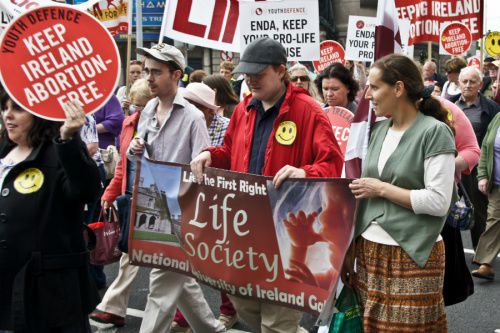Pro-life groups in Ireland are charging that a United Nations human rights committee contradicted its mission when it ruled that the Republic of Ireland’s laws against abortion violated a woman’s rights.
The ruling’s critics included Niamh Ui Bhriain of Ireland’s Life Institute.
“Instead of protecting the most vulnerable, the U.N. has chosen, yet again, to champion abortion, and has trampled on the right of people with disabilities,” she said. She charged that the committee “seriously undermined its credibility by rushing to support abortion.”
Ui Bhriain told CNA the committee used “the ugly language of discrimination” in using terms like “fetal abnormality.”
“Their reasoning is so distorted that it has lost all meaning,” she said. “Abortion is inhumane, and the U.N. should seek to find progressive answers to assist women who are told their babies may not live for long after birth.”
The Republic of Ireland’s constitution equally recognizes the right to life of both the mother and her unborn child in its Eighth Amendment, against abortion. Pro-abortion rights lobbyists have targeted the amendment for repeal.
Members on the human rights committee of the Geneva-based U.N. High Commissioner on Human Rights called for legal changes, including constitutional changes, to ensure “effective, timely and accessible procedures for pregnancy termination in Ireland.”
The committee, in their ruling distributed June 9, stated that the Irish government must compensate a woman who wanted a legal abortion, saying that the country’s laws against abortion violated her rights to freedom from cruel, inhuman, or degrading punishment.
According to the committee, Ireland’s restrictive abortion laws caused severe emotional and mental pain to the woman, who was told in 2011 she could not have an abortion in Ireland. Doctors had discovered her unborn baby had congenital defects and said the baby would die in the womb or shortly after birth.
The committee said Ireland violated the woman’s rights by forcing her to choose between “continuing her non-viable pregnancy or travelling to another country while carrying a dying fetus, at personal expense, and separated from the support of her family, and to return while not fully recovered.”
The ruling also criticized Irish law limiting advocacy or promotion of abortion. It drew from the International Covenant on Civil and Political Rights, to which Ireland is a signatory.
Ui Bhriain objected that the committee did not hear evidence from families who had carried sick babies to term. She said this evidence “would have shown that continuing with the pregnancy, rather than aborting the baby, brings great joy and love.”
Other critics of the committee include Michael Kelly, editor of the Irish Catholic newspaper.
“I’m afraid that the Human Rights Committee has exposed itself as effectively a pro-abortion lobby group, which, at the very least, calls in to question the body’s right to comment on matters in relation to human rights,” Kelly told CNA.
He objected that the action called into question the right to life of children with life-limiting conditions. Kelly said the ruling was “a deep betrayal” of the U.N.’s founding principles and its commitment to defend human rights.
The pro-abortion Center for Reproductive Rights, headquartered in New York City, had filed the complaint to the U.N. human rights committee on the woman’s behalf.
Leah Hoctor, the center’s European regional director, said the decision would encourage those seeking legal change in countries where abortion is criminalized, the U.K. newspaper The Guardian reports.
Ui Bhriain charged that the Center for Reproductive Rights “used the most vulnerable children of all, unborn babies with severe disabilities, to try to drive a wedge in Ireland’s abortion laws.”
Kelly told CNA that Ireland’s current government has pledged to hold a citizens convention on the issue of repealing the Eighth Amendment to the Republic of Ireland’s constitution. The exact details are not confirmed, but politicians and members of the general public will be among the convention’s members.
Kelly said there is concern that pro-abortion lobbyists will infiltrate the gathering. He also voiced concern that parliament is abdicating its responsibility by referring the issue to the convention.
Smaller political parties in Ireland have called for making abortion available, but the 2016 general election saw many pro-life deputies elected to parliament.
In Kelly’s view, the ruling will have an impact on the campaign to legalize abortion in Ireland.
“Unlike other countries, Ireland has tended to fetishize U.N. rulings in recent years and seems to pay more attention to opinions from international organizations than it does to public opinion in Ireland,” he said.
Kelley said the Irish pro-life movement is mobilized, but needs to intensify its efforts.
“The pro-abortion lobby is extremely well-funded and supported from overseas,” he said. “Pro-life campaigners must redouble their campaign to make politicians aware of the depth of feeling that there is in Ireland to defend the pro-life position of our constitution.”
Archbishop Eamon Martin of Armagh has called for “strong character” to defend the right to life of mothers and babies, the Irish Catholic reports.
“May we never forget that the defenseless unborn child is a real, human person, worthy of love and protection,” he said at the 30th anniversary celebration of the All Ireland Rosary Rally at Knock shrine.

